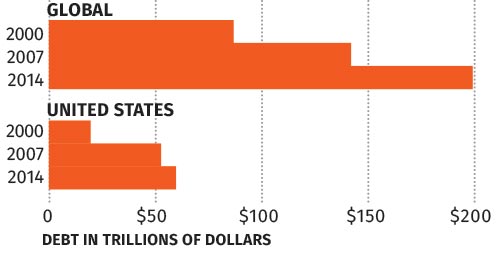
The year 2016 has been off to a rocky start for financial markets. Stock markets across the globe fell sharply in January as concerns about China’s economy, plummeting oil prices, and the Federal Reserve raising interest rates made investors wary. The economic outlook, in turn, also worsened, as a growing number of observers fear the U.S. economy is getting closer to a recession.1 Even the International Monetary Fund downgraded its forecast for global economic growth.2
So what are Seventh-day Adventist Christians to make of this economic uncertainty? How should believers respond with their time, wealth, and talents to such financial volatility? These are important questions, but they are not new. Church members had to wrestle with them during the Great Depression of the 1930s and more recently during the Great Recession of 2007-2009. Many Adventists viewed these economic crises as signs of the times, and were sure they indicated that Christ’s return was imminent. Others were perplexed as to why God allowed such trying times.
As Seventh-day Adventist economists, we too have grappled with what these questions mean for believers. While there are no easy answers to these questions, we have identified three important principles in the Bible that can help us weather these financial storms.

The first principle is to “occupy till I come” (Luke 19:13, KJV). The word “occupy” here means to conduct trade, and is the reason the New King James Version translates this passage “Do business till I come.”3 This well-known passage from the parable of the minas (talents) is a reminder that we are to be actively engaged in our calling regardless of the state of the economy. We are not to be fearful like the servant who hid his mina, but are to employ our time, wealth, and talents at all times. Financial crises should not stop us.
Some Adventists, however, are more prone to act like the fearful servant. We know, for example, Adventists who have forgone education, starting a business, and marrying because they were worried that the end was near. Only later in life did they realize that these missed opportunities might have been their calling, their way of most effectively sharing God with the world.
Many well-meaning Adventists succumbed to these same fears during the Great Recession of 2007-2009. They sold their businesses, cashed out their savings, and quit their jobs because they were certain it was the end of time. But this is not what God has called us to do. He calls us to “occupy” until He returns. And since no one knows the “day or hour” (Matt. 24:36), we are called to use our time, wealth, and talents until the very end. Doing so will not only be a blessing to others, but it will keep us from getting worked up by the latest economic crisis.
The second principle builds upon the first one. Not only should we “occupy” until He comes, but we should do so in a manner that most efficiently uses our time, wealth, and talents. To make the best use of our time, we are called to engage in time management (Eph. 5:15, 16; Col. 4:5) and in taking care of our health (1 Cor. 6:19, 20). The former helps us organize our time, while the latter improves the quality of our time. People who are both good time managers and healthy are better prepared to handle the vicissitudes of economic crises.
The Bible is also very clear about engaging in good wealth management. In Ecclesiastes 11:2 it explicitly directs us to diversify our asset holdings by dividing our “portion to seven, or even to eight, for you do not know what misfortune may occur on the earth” (NASB).4 The same chapter also tells us to take measured risks. Together, this implies Adventists should have a portfolio of assets adjusted for their age and risk preferences. Not only is it biblical, but it also better insulates one’s wealth against the financial market’s volatilities.
We have all been given a calling and the talents to accomplish this calling (1 Peter 4:10; Rom. 12:6). We will be most effective for God if we discover and act upon that calling. God can use us no matter what choices we make, but we will be the most productive and satisfied when we put to use the specific talents God has given each of us individually. We will also be more capable of responding to the whims of business cycles.
The third principle to helps us weather financial storms is to recognize only God knows “the end from the beginning” (Isa. 46:10). Consequently, we should leave the worrying about end times to Him. This, however, is often tough for Adventists given our understanding of prophecy. We know earth’s time is short, so it is hard for us not to see the latest economic calamities as signs of Christ’s soon return.
Many Adventists saw the Great Recession of 2007-2009 and the unprecedented federal government response to it as a sign of the end.
For example, during the Great Depression of the 1930s editors of both the Review and Herald and the Signs of the Times were certain that the end was near. They saw the Depression as a “striking fulfillment of prophetic prediction”5 and a precursor of a soon-to-be “religious dictatorship.”6 More recently many Adventists saw the Great Recession of 2007-2009 and the unprecedented federal government response to it as a sign of the end. Yet seven years later Christ has still not come. This should give us pause.
We should have the humility to recognize that we do not have it all figured out. We do not “know the works of God who makes everything” (Eccl. 11:5, NKJV) and changes “the times and the seasons” (Dan. 2:21, NKJV). Once we accept this reality, we will spend less time worrying about the eschatological meaning of the latest financial crisis and instead simply trust that God is working out all things for the good (Rom. 8:28).
One of our fathers, while still in college and searching for God, happened to take a class from an old economics professor at a large state university. The class was macroeconomics and the professor spent the semester trying to explain the inner workings of the U.S. economy. At the end of the semester, however, the professor made a startling confession to the class. He said that in the end only God knows what really drives the economy. The professor’s humility stunned the class, but it convicted the heart of my searching father.
As Adventists, we need to have this same humility. We also need to “occupy” until God comes in the most productive manner possible. If we do, we will be able to weather the financial storms that lie ahead.

David Beckworth is a former U.S. Treasury economist, visiting Mercatus scholar, and associate professor of economics at Western Kentucky University. Josefer Montes is the dean and a professor in the School of Busines
s at Walla Walla University.